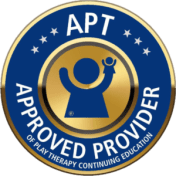Young Children, Trauma, and Play Therapy — November 3rd, 2023
This workshop will address how it is that a playroom, with its toys, might contain the healing work of our youngest people, ages 3 – 12 years. Who are these toys when they shoulder the child’s own story? How might the therapist partner with those stories as dynamic agents who present the child with inroads through their own intrusions? As the primary tool in the playroom, what is essential in our presence? Addressing the work of young children, Dott will identify key developmental milestones that lean on relationship for their achievement, particularly the insights of implicit memory and how it manifests in play.

Presenter: Dott Kelly, MA, LMHC
Location: In-Person, Shoreline Lake Forest Park Senior Center (18560 1st Ave NE #1 Shoreline, WA 98155)
Date: Friday, November 3, 2023
Time: 9am-3pm PST (Convert Time Zone)
5 APT Contact CE Hours*
*These CE hours are applicable for the Registered Play Therapist (RPT) credential and other mental health credentials in WA. For other states, please consult your state-specific CE requirements.
Level: Beginner, Intermediate
Early Bird Price: $160 (Register by 9/30)
Regular Price: $200
Currently unavailable. Subscribe to our mailing list to get notified when it becomes available.
Description
This is not a case consultation group; however, there will be time to unwrap questions and concerns, and apply them to the participant’s clinical cases.
Following the workshop, participants will be able to:
- Track the metaphors used by children in their play.
- Follow the therapist’s efforts to understand both the developmental arrests in the child due to trauma, and to put these comprehensions to use in understanding the development of the play therapy process.
- Deepen your understanding of the use of sandtray as a primary tool in nonverbal play therapy.
- Recognize the workings of intrinsic memory in young children and play therapy.
- Have an understanding of the use of the self of the therapist in play therapy.
Learning Objectives:
- Describe phases of play that occur during the construction of therapeutic relationship.
- Demonstrate how the brain supports and enhances imaginal work with the child. Emphasis on intrinsic memory and accessing this meaning-maker in play.
- Utilize children’s processes, to construct a common baseline of theory into actual play therapy (from abstraction to action).
- Demonstrate an understanding of the use of self in our work with children and their play.
About the Presenter:
Over the past thirty-some years, Dott Kelly has been working with young children who suffer from the effects of trauma and its impacts on attachment. In 1999, Dott founded Jumping Mouse Children’s Center. Understanding how children depend on adults for regulation and well-being, Dott has constructed a model that relies on the safe dynamics between people rather than diagnoses that concentrate on children’s behaviors. Play, rather than talking, is a child’s natural way of communicating. Child-centered materials utilize children’s own metaphoric approach to understanding, and to repair. This play therapy model integrates the use of expressive therapies that include sandtray, art, writing, puppets, and movement. Dott will share casework that reveals the child’s interior world and the relationship of the therapist to the child’s in-depth work.
Dott has written a book, Being Found: Healing the Very Young Through Relationship and Play Therapy.

APT Approved Provider 18-545

